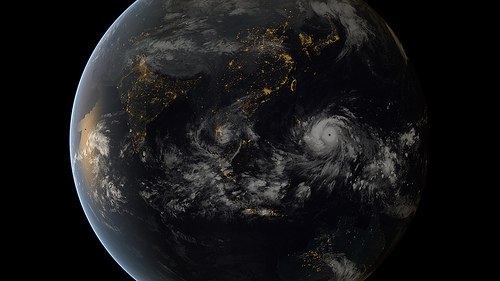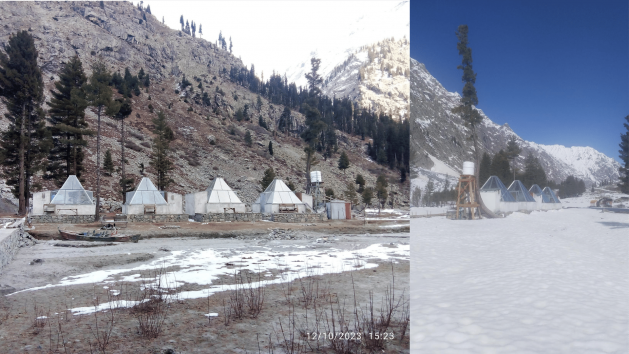
[ad_1]
Creator and Web page data
- This web page: https://www.globalissues.org/article/803/cop19-warsaw-climate-conference.
- To print all data (e.g. expanded facet notes, reveals different hyperlinks), use the print model:
On this web page:
Introduction
November 11 – 23, 2013, Warsaw, Poland was the venue for the nineteenth annual United Nations Local weather Change Convention, often known as the nineteenth Convention of the Events — or COP 19.
The aim of this convention was to create a loss and injury pillar of a brand new local weather treaty to be finalized in 2015. The opposite two pillars mentioned in earlier conferences are mitigation (emission reductions) and adaptation pillars.
Assembly end result
The principle end result of the assembly was the institution of a global mechanism for a loss and injury related to local weather change impacts .
Predictably, the loss and injury side of local weather negotiations introduced out the worst in some nations. Some growing nations have been going to withstand the thought of financing adaptation to local weather change, whereas others appeared to hate the thought of local weather reparations for poor nations. Just a few years earlier, industrialized nations had made a authorized dedication to a world local weather fund. Unsurprisingly, not a lot got here of it, as Inter Press Service summarized,
In 2009 on the semi-infamous Copenhagen talks, the wealthy nations made a take care of growing nations, saying in impact:
We’ll provide you with billions of {dollars} for adaptation, ramping as much as 100 billion {dollars} a yr by 2020, in trade for our mitigation amounting to small CO2 cuts as a substitute of creating the massive cuts that we should always do.The cash to assist poor nations adapt flowed for the primary three years however has largely dried up. Warsaw was alleged to be the
Finance COPto convey the promised cash. That did not occur.International locations like Germany, Switzerland and others in Europe solely managed to scrape collectively guarantees of 110 million {dollars} into the Inexperienced Local weather Fund. Growing nations wished a assure of 70 billion a yr by 2016 however have been blocked by the U.S., Canada, Australia, Japan and others.
It obtained to the purpose that lots of of representatives from numerous NGOs walked out of the negotiating rooms to protest in opposition to developed nations’ reluctance to decide to a loss and injury mechanism. And this was a day after the G77+China group of 133 growing nations walked out of negotiations over the identical factor.
Wanting by way of the briefing reviews from the revered NGO, the Third World Community, It appears that evidently on the floor, whereas an end result was ultimately thrashed out, there are lots of areas of weak spot of adequate vagueness to fulfill everybody that contentious points which can be seemingly resolved can nonetheless be challenged and adjusted sooner or later.
In context: widespread however differentiated obligations
A few years in the past all nations agreed that local weather change was largely the results of actions from right now’s industrialized nations, as carbon dioxide — the primary greenhouse gasoline — stays within the environment for many years. But, the poorest would find yourself struggling essentially the most for an issue they largely didn’t trigger. The approaches to mitigation (emissions discount) would subsequently be totally different for these teams of nations — the widespread however differentiated obligations precept.
It’s on this context that the dialogue for loss and injury has come about. And it’s one thing that wealthy nations are eager to eliminate .
The years of resistance on this situation (and lots of others) means every time it’s mentioned once more the reactions appear to get much more hostile. Mixed with the dearth of detailed context within the mainstream media protection of this side, it then turns into simpler every time to see culprits as China and India given their monumental greenhouse emissions in recent times, in comparison with the far higher quantity by the industrialized nations over the longer interval. See this web site’s part on local weather justice for extra detailed background.
In context: Hurricane Haiyan

The assembly got here on the time when the devastating Hurricane Haiyan had simply killed hundreds within the Philippines and affected thousands and thousands extra. It was an ominous warning of what could possibly be extra frequent as local weather change continues to take maintain.
It was additionally an instance of how poorer nations could possibly be affected by an issue they’ve largely not been liable for and that whereas all of the worldwide outpouring of assist and help was extremely welcome, that assist for stopping and adapting to such occasions is paramount and efforts are urgently wanted to curb emission will increase.
In an emotional speech the Philippines lead negotiator for the convention, Naderev Saño, obtained a standing ovation for asserting that he’ll go on a starvation strike till a significant end result is in sight.
Lack of urgency
Inter Press Service (IPS) famous the seeming lack of urgency given the years and years of delay and watering down of significant motion:
To have likelihood at staying below two levels C, industrialised nations have to crash their CO2 emissions 10 p.c per yr beginning in 2014, mentioned Kevin Anderson of the Tyndall Centre for Local weather Change Analysis on the College of Manchester.
We will nonetheless do two C however not the way in which we’re going,Anderson mentioned on the sidelines of COP 19 in Warsaw. He puzzled why negotiators on the within aren’t reacting to the truth that it’s too late for incremental modifications.
I’m actually surprised there isn’t a sense of urgency right here,he instructed IPS.
Extra data
Because the convention continues to be underway as this web page is written, extra data can be added right here after the occasion is over.
For extra concerning the points from different organizations, listed here are some beginning factors:
Information tales from IPS
Under is an inventory of tales from Inter Press Service associated to the Warsaw local weather convention and its aftermath.
-
Drawing a line within the sand as communities adapt to local weather change
– UN Information

Communities in a number of the most climate-change-affected areas in southern Madagascar are discovering methods to thrive in more and more difficult environments by turning into extra resilient and adapting to unpredictable climate patterns.
-
Local weather and battle collide on the excessive seas: UN warns of hovering prices and delays
– UN Information

Assaults on business transport within the Pink Sea coupled with wider geopolitical and climate-related crises, are upending worldwide commerce, inflating prices and inflicting main delays, the UN’s commerce and improvement physique mentioned on Thursday.
-
Phasing out from Fossil Fuels: An Crucial for Local weather Justice
– Inter Press Service

YAOUNDE, Feb 20 (IPS) – Local weather change made 2023 the warmest yr on report. As urgency mounts to handle this worldwide disaster, phasing out using fossil fuels is a mandatory step that every one nations should take. It is because fossil fuels—coal, oil and gasoline — are the first drivers of the local weather disaster accounting for over 75% of worldwide greenhouse gasoline emissions and almost 90% of all carbon dioxide emissions.
-
Local weather-affected Madagascar adapts to new actuality: A Resident Coordinator weblog
– UN Information

Folks dwelling in Madagascar are studying to adapt to quickly altering weather conditions in what is alleged to be the fourth most local weather change affected nation worldwide; that’s in accordance with the UN Resident Coordinatoressentially the most senior UN official within the Indian Ocean island nation.
-
Grassroots Voices Unite to Name for Local weather Justice
– Inter Press Service

KATHMANDU, Feb 16 (IPS) – Kiprotich Peter from the East African nation of Kenya is making an attempt to convey his local weather disaster message utilizing the platform of the World Social Discussion board (WSF) happening within the mountain nation of Nepal, which has additionally been battered by the impacts of local weather change.
-
Rising starvation: UN chief identifies wars, local weather chaos as aggravating elements
– UN Information

International locations should act now to interrupt the lethal hyperlinks between battle, local weather and meals insecurity, UN Secretary-Common António Guterres mentioned on Tuesday, addressing a Safety Council assembly centered on these challenges.
-
Local weather Change Is Amplifying Family’s Meals Insecurity, Placing Extra Strain on Girls’s Psychological Well being
– Inter Press Service

KATHMANDU, Feb 12 (IPS) – Research have lengthy proven that some ladies’s decrease standing in Nepali households might imply that they eat final and fewer and consequently lack diet. Specialists are actually trying into how this might have an effect on their psychological well being, and if the rising impacts of local weather change may amplify the method.
-
Hit by Local weather Change, Authorities Search to Enhance Saffron Yields in Kashmir
– Inter Press Service

SRINAGAR, India, Feb 07 (IPS) – Saffron, the costly spice from the Kashmir Himalayas, has been going through challenges for years, largely associated to yields and insufficient irrigation compounded by the local weather disaster.
-
Highway to COP29: Highest Local weather Ambitions Wanted to Decarbonize World
– Inter Press Service

NAIROBI, Feb 05 (IPS) – The highway to COP29 has begun in earnest within the backdrop of a world local weather report indicating that not solely was 2023 the warmest yr in a 174-year local weather report, it was the warmest by far. File-breaking temperatures, mixed with El Niño, pushed weak and poor nations within the International South to the frontlines of utmost and extreme climate occasions.
-
How Asia Can Unlock $800 Billion of Local weather Financing
– Inter Press Service

WASHINGTON DC, Jan 31 (IPS) – International locations within the Asia-Pacific area face a shortfall of not less than $800 billion in local weather financing. With public funds depleted by the pandemic, policymakers should unlock the huge potential of personal capital to affix the combat extra successfully in opposition to international warming.
-
Snow Tales: Too Little, Too Late, Say Local weather Specialists
– Inter Press Service

KARACHI, Jan 29 (IPS) – Whether or not the late snow in Pakistan’s Gilgit-Baltistan area is an anomaly or a sign of the impacts of local weather change, which brings erratic and at instances devastating climate patterns, specialists within the area consider not sufficient is being invested within the improvement of capacities, techniques, and infrastructure to enhance resilience.
-
Underneath the Scorching Solar Kenyan Farmers Discover New Methods to Beat Local weather Change
– Inter Press Service

KOTIANG, KENYA, Jan 26 (IPS) – Rural Kenyans are forging a path towards a extra sustainable future and defending their lives and livelihoods from local weather change by way of regenerative agriculture, nurturing hope for his or her communities and the surroundings.
-
IPS Affords Local weather Change Justice Fellowship
– Inter Press Service

UNITED NATIONS, Jan 24 (IPS) – IPS is providing an distinctive alternative for 2 journalists to develop their understanding of local weather change justice.
-
Matchmaking for Inexperienced Cities? Accelerating Local weather Finance in City Areas
– Inter Press Service

BANGKOK, Thailand, Jan 23 (IPS) – Asia and the Pacific is residence to 54 per cent of the world’s city inhabitants, who’re disproportionately weak to the impacts of local weather change (ESCAP, 2023; IPCC, 2022). Why then, do local weather motion initiatives in cities generally face delays in implementation?
-
Superior Economies Should Let the IMF Play a Productive Position on Local weather
– Inter Press Service

WASHINGTON DC, Jan 12 (IPS) – The world faces the existential risk of a local weather change disaster, and it’s turning into more and more clear that the end result of the most recent UN local weather summit, COP28 — hosted because it was by the CEO of one of many world’s largest oil firms, and stuffed with a report quantity of fossil gasoline lobbyists — isn’t going to do a lot to vary that.
-
World Information in Temporary: Time for local weather justice urges UN chief, Ukraine warfare replace, name for ‘free and truthful’ elections
– UN Information

The European local weather company on Tuesday reported that report international warmth final yr confirmed an general improve of 1.48°C above pre-industrial ranges – only a fraction under the 1.5-degree threshold laid out by the historic Paris Settlement on local weather change.
-
Peru’s Andean Peoples ‘Revive’ Water that the Local weather Disaster Is Taking From Them
– Inter Press Service

CUZCO, Peru, Dec 18 (IPS) – “The wealthy world has brought about the local weather change that’s drying up our water sources, and right here we’re doing all the pieces we will to get better them as a result of in any other case we’ll die,” mentioned Juan Hilario Quispe, president of the small farming group of Muñapata, simply over 50 kilometers from the Peruvian metropolis of Cuzco.
-
IFAD’s File-Breaking Pledges: Lifeline for Rural Communities Cornered by Local weather, Starvation
– Inter Press Service

NAIROBI, Dec 15 (IPS) – The world isn’t on monitor to finish starvation and poverty as a way forward for rising meals insecurity and local weather challenges beckon. Small-scale farmers are the spine of meals manufacturing, producing one-third of the world’s meals and as much as 70 p.c of the meals consumed in Africa and Asia, but they’re usually lower off from the companies they should pull themselves out of poverty and meals insecurity.
-
INTERVIEW: ‘Local weather of division’ creating more difficult surroundings for UN peacekeeping
– UN Information

UN peacekeeping missions in Sub-Saharan Africa are working below more difficult political and safety circumstances on account of a multiplication of crises and a “local weather of division” amongst Member States, notably within the Safety Council. That’s in accordance with the pinnacle of UN Peacekeeping, Jean-Pierre Lacroix.
-
Its Time To Align Local weather Finance and Social Justice, Says Youth Local weather Activist
– Inter Press Service

DUBAI, Dec 12 (IPS) – Joshua Amponsem, co-director of the Youth Local weather Justice Fund, believes it’s time to guarantee local weather finance and social justice points are elevated to the highest of the agenda and negotiations at COP28.
-
Local weather advocates demand stronger COP28 language on fossil fuels
– UN Information

The newest COP28 draft end result textual content launched to negotiators in Dubai Monday night dropped a name to ‘phaseout’ fossil fuels, prompting outcry from local weather weak nations and civil society.
-
Local weather Justice is the Accountability of the Wealthier Nations, Says Bangladesh Local weather Envoy
– Inter Press Service

DUBAI, Dec 11 (IPS) – Wealthier nations should ship the funds so growing nations can adapt—the time for excuses is over, says Saber Hossain Chowdhury, Bangladesh’s Particular Envoy for Local weather Change within the Prime Minister’s Workplace.
-
Greening Schooling: Schooling Paying Highest Value for Ongoing Local weather Disaster
– Inter Press Service

DUBAI, Dec 09 (IPS) – It’s a international disaster of astounding proportions that thousands and thousands of kids are on the run right now, forcibly displaced from their houses. As battle and local weather change more and more grow to be essentially the most urgent challenges going through the world now, the variety of displaced youngsters has doubled within the final decade alone, reaching a report excessive of 43.3 million youngsters.
-
For Africans, the Local weather Debate Across the Position of Livestock Misses the Mark
– Inter Press Service

NAIROBI, Kenya, Dec 08 (IPS) – Africa is contending with a local weather disaster it didn’t create with out adequate recognition for the distinctive rights and desires of the world’s youngest and fastest-growing inhabitants. Not solely is the continent least liable for decreasing greenhouse gasoline emissions, having traditionally produced only a tiny fractionhowever it is usually disproportionately impacted by the implications of emissions generated elsewhere.
-
Why Local weather Justice and International Monetary Reform Are Inseparable
– Inter Press Service

DUBAI & DOMINICA, Dec 08 (IPS) – An award-winning worldwide improvement knowledgeable and a local weather justice knowledgeable have known as for a rethink of the worldwide monetary system that may convey reparatory justice to small, climate-vulnerable nations whereas providing concessionary improvement financing to the nations most in want of help.
-
Our voices and desires should be put first in local weather talks, younger individuals inform COP28
– UN Information

Younger local weather advocates at COP28 in Dubai on Friday mentioned they won’t sit idly by whereas local weather change threatens their futures. They demanded that authorities policymakers put the wants of the world’s almost 2 billion youngsters first – their voices and concepts may also help rescue the planet.
-
Religion Pavilion Provides Non secular Dimension to Local weather Disaster Decision
– Inter Press Service

DUBAI, Dec 07 (IPS) – For the primary time at COP28, religion has a pavilion alongside science, know-how, nations, and philanthropy, permitting spiritual leaders from all around the world to debate the potential for utilizing religious deserves to guard the earth from local weather change.
-
COP28: Local weather Migrants Rights, Danger-based Labor Polices Underneath the Highlight
– Inter Press Service

DUBAI, Dec 07 (IPS) – With COP23 underway, researchers and activists are pointing on the plight of local weather migrants.
-
COP28 is about motion, not politics and level scoring, says UN local weather chief
– UN Information

UN local weather chief Simon Stiell mentioned on Wednesday that COP28 delegates aren’t in Dubai to “rating factors” and play at “lowest-denominator politics”; they need to take bold motion on curbing international warming and ending the local weather disaster.
-
Rising Local weather Finance Infrastructure to Match Africa’s Inexperienced Bankable Options
– Inter Press Service

DUBAI, Dec 06 (IPS) – Though lengthy profiled because the face of local weather change, a high-risk continent with a pipeline of unbankable inexperienced initiatives, there are areas the place Africa is main the world. The 1987 unintentional discovery of the primary deposit of pure hydrogen throughout a water drilling marketing campaign in Bourakebougou village, Mali, is right now proving that Africa can export viable inexperienced options.
Creator and Web page Info
- Created:
[ad_2]